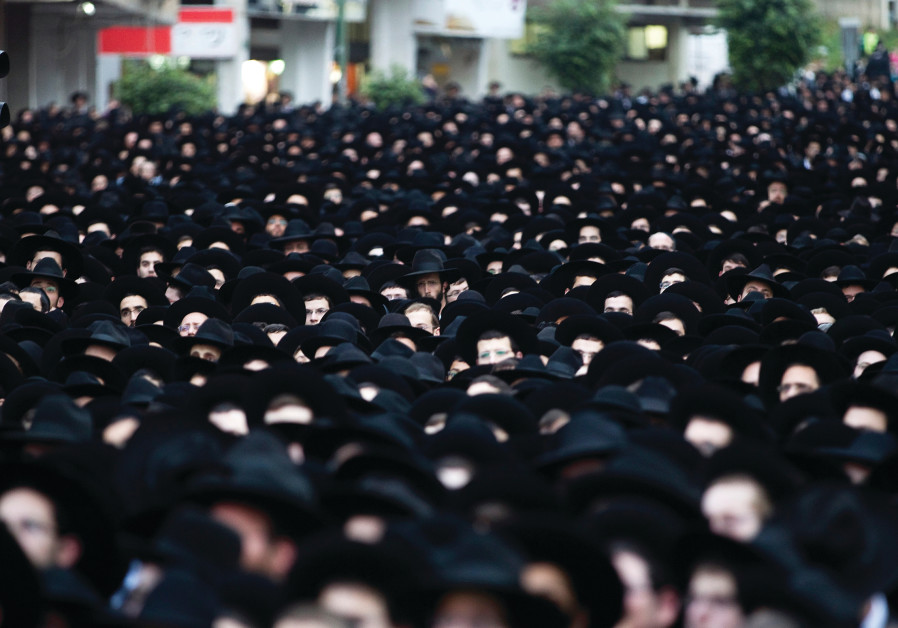Liberman made religious tyranny the enemy, not the Left – analysis

HAREDIM GATHER en masse in Bnei Brak. Is their leadership’s political model sustainable?. (photo credit: RONEN ZVULUN / REUTERS)
Forget about Left-Right Israeli politics – that’s so winter 2019.
If Israelis have learned anything over the last two months, it is that it’s all about the Right – but the Israeli Right does not necessarily secure a victory.
Prime Minister Benjamin Netanyahu successfully branded the initial winter election campaign for the 35th government and the 21st Knesset early on in the race, with his famous “Bibi or Tibi.”
In so doing, he reduced a complex political map to one central question: did voters want a left-wing government that would give up the West Bank and divide Jerusalem, or did they want a right-wing government that would keep them?
His left-wing branding was fairly broad, including within it the Blue and White Party – even though the party’s platform never spoke of supporting a Palestinian state and included well-known right-wing politicians such as former chief of staff Moshe Ya’alon.
The going wisdom was that the opportunity for a pro-right resolution to the Israeli-Palestinian conflict was so strong under the Trump administration that the right-wing parties should forgo all of their partisan concerns in favor of a secure right-wing government.
Indeed, Israeli voters did lean Right when they went to the polls, giving those parties more votes than for the Left bloc. But the Trump factor was not strong enough to erase the divisions among them.
In the immediate aftermath of his failure to form a government – falling short by only one seat – Netanyahu immediately blamed Yisrael Beytenu Party head Avigdor Liberman, calling his former right-wing partner “left-wing” for not accepting a compromise platform that would have allowed for a government of 65, including the religious parties.
But it was a phrasing that fell short of the mark, given the disarray in the Right.
In so doing, Netanyahu left the stage wide open for Liberman to immediately brand the next election not as Left or Right, but as an exclusively right-wing battle for civil liberty versus religious tyranny.
Liberman, a Moldovan immigrant from the former Soviet Union, has formed a niche for himself as a right-wing secularist who lives in the West Bank settlement of Nokdim, is strong on security, and is a supporter of the division between religion and state.
“We want a nationalist government, not a haredi [ultra-Orthodox] government,” Liberman told reporters on Thursday morning, as he set as a target for the next election a secular right-wing government.
It was a brave move for a politician who political pundits had speculated would not even pass the threshold in April. Then when he sputtered back to life with five seats, speculation was high that he would be so grateful to be on the stage that he would make any compromise necessary out of fear that his party would disappear in a do-over election.
But for Liberman, the fear was the harm done by signing onto Netanyahu’s government, not the danger of new elections if he refused.
Had he entered the coalition, Liberman theorized he would have chalked up a series of failures, not successes. Liberman had already walked out of the last government because he didn’t want to be saddled with a failed Gaza policy and a restrained West Bank policy that did not include the demolition of the illegal Bedouin herding village of Khan al-Ahmar.
Nothing was likely to change on those fronts had Liberman entered into a coalition agreement this time, except that he would have added a failed civil liberties agenda by sitting in a government in which the ultra-Orthodox parties with their 16 seats were due to have a heavy influence.
But Liberman, a man who dreams of the premiership, is banking on new elections strengthening him, possibly sending his party into double digits, and maybe even besting Netanyahu as the head of the right-wing and the leader of the country.
Israeli voters have favored power and courage, and this latest Liberman gamble has shown that he has both – in spades. In addition, he is likely to garner voters from a large and rarely mentioned Center bloc of 74 seats – Likud, Blue and White, and Kulanu – that was uncomfortable with Netanyahu’s willingness to form a government with such a heavy ultra-Orthodox influence.
Netanyahu shot back at Liberman on Thursday night saying that he had a 20-year history of making deals with the ultra-Orthodox parties. He also continued along the well-tread lines of the April election, blaming Liberman for destroying what would have been a strong right-wing government.
But had that kind of logic worked, Netanyahu would have already had a government. What the election showed is that the right-wing has won the Israeli electoral heart, but did not successfully answer the question of what kind of a right-wing government the voters wanted.
It is there that Liberman is gambling – by seizing an opportunity to make this election about what is the optimal right government, and throwing down the gauntlet to the voters – asking them to choose between a government that values secular civic rights or religious ones.
Now is the time to join the news event of the year – The Jerusalem Post Annual Conference!
For more information and to sign up, click here>>






Comments are closed.